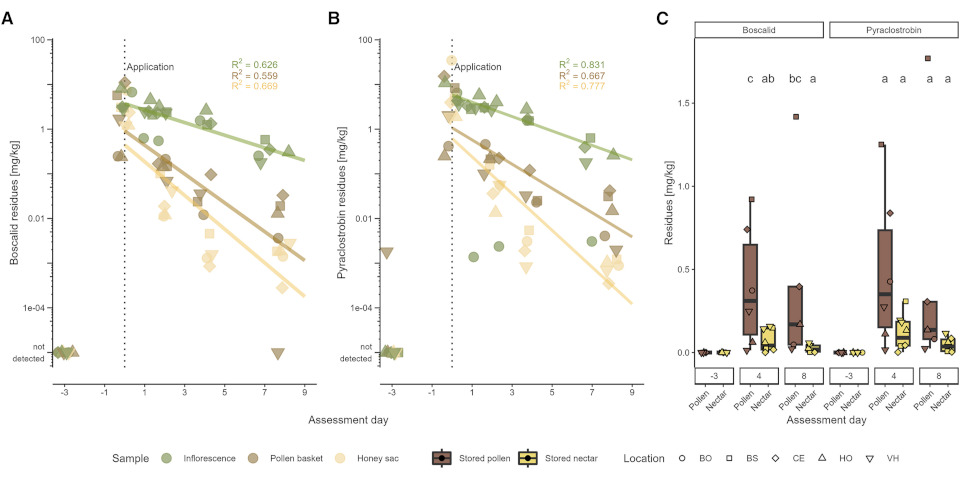Residues of plant protection products (PPPs) are frequently detected in bee matrices1–6 due to foraging bees collecting contaminated nectar and pollen, which they bring back to their hive. The collected material is further used by nurse bees to produce glandular secretions for feeding their larvae.7 Potential exposure to PPPs occurs through direct oral ingestion, contact during foraging, or interaction with contaminated hive material. 8,9 Contaminants can pose health risks to adult worker bees,10,11 queens,12,13 drones (males),14 or larvae,15,16 potentially impacting colony health and productivity. However, residue concentrations can vary significantly between analyzed matrices, and potential accumulation or dilution steps have not been widely investigated. Although research has provided valuable insights into contamination risks, there remain gaps in our understanding of the entire pathway from field, via foragers, stored products, nurse bees, and finally to food jelly, i.e., royal, worker, and drone jelly, and the larvae, including all possible processing steps.17 We collected samples of bee-relevant matrices following the in-field spray application of the product Pictor Active, containing the fungicides boscalid and pyraclostrobin. The samples were analyzed for residues along this entire pathway. Fungicide residues were reduced by a factor of 8–80 from stored product to nurse bees’ heads, suggesting a filtering function of nurse bees. Furthermore, detected residues in larval food jelly resulted from added pollen and not from nurse bee secretions. Calculated risk quotients were at least twice as low as the threshold values, suggesting a low risk to honey bee colonies from these fungicides at the tested application rate.
Nurse honey bees filter fungicide residues to maintain larval health
You are here:
Share this post

Author: SilvioErler
https://www.researchgate.net/profile/Silvio_Erler/publicationssince 2022 - Privatdozent (lecturer) at Technische Universität Braunschweig, Zoological Institute since 2020 - Deputy head of the institute, Institute for Bee Protection at JKI 2019-2020 - Senior research associate at Julius Kühn-Institute (JKI) – Federal Research Centre for Cultivated Plants, Institute for Bee Protection (Germany) 2018-2019 - Deputy chair of 'Animal Ecology' at MLU Halle-W. (Germany) 2013-2018 - Lecturer at MLU Halle-W. (Germany) 2012-2013 - PostDoc (University of Agricultural Sciences and Veterinary Medicine Cluj-Napoca) 2012 - Dr. rer. nat. (Martin-Luther-University Halle-W. Germany) 2008 - Diploma in Biology (Martin-Luther-University Halle-W. Germany)






